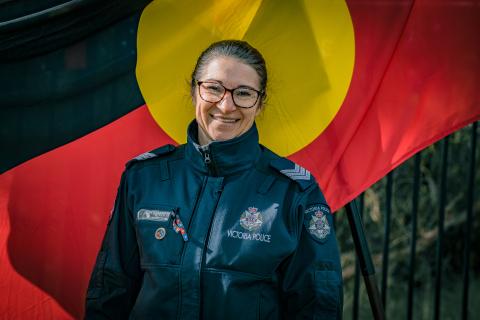Evaluation of the Aboriginal Inclusion Strategy and Action Plan 2018–2021
At the conclusion of the 2018–2021 Action Plan, Victoria Police committed to undertaking a comprehensive and independent evaluation of its progress and performance.
Yilki Guludun Tagai (YGT) Law and Biocultural Knowledge were engaged to conduct the evaluation which included consultation involving yarning circles, group facilitated discussions, data collection and analysis.
YGT’s evaluation concluded that Victoria Police had fallen short in achieving meaningful change through the implementation of the plan.
At a strategic level, the evaluation pointed to the need for the actions in this new plan to be more targeted and achievable in the lifespan of the plan.
A smaller number of targeted actions will enable a greater impact when tied to relevant and specific outcomes, allowing for greater emphasis on ongoing monitoring, evaluation and learning.
The evaluation identified key focus areas to be:
Self-Determination
- YGT’s evaluation concluded that Self-Determination and Aboriginal culture, history and agency are yet to be fully embraced and prioritised in Victoria Police. There is scope to work on fundamental aspects of Self-Determination policy and practice.
Cultural safety and wellbeing
- Cultural safety and wellbeing for Aboriginal and Torres Strait Islander employees continues to be an area that requires significant focus.
- Providing safe and culturally appropriate avenues for Aboriginal and Torres Strait Islander employees to report discrimination or seek assistance was highlighted as an area of priority.
Leadership
- Leadership capability, awareness and support of Aboriginal culture and of Self-Determination within the organisation was a critical foundation.
- A need was identified for improved transparency from senior leadership on the progress of Aboriginal and Torres Strait Islander inclusion through engagement with employees and community.
Governance
- A governance framework or structure is required to oversee the implementation of actions and initiatives linked to the plan and subsequent strategies.
- Governance should include utilisation of knowledge, experience and leadership of Aboriginal and Torres Strait Islander employees and stakeholders when developing policies and procedures that will directly impact them.
A yarn with Sergeant Melissa Peters, a proud Yorta Yorta, Ngurai Illum Wurrung, Dja Dja Wurrung, Wamba Wemba and Wadi Wadi woman
Behind the badge
Melissa is a First Nations woman with Polish heritage. She graduated from the Victoria Police Academy in 1998.
Melissa was recently promoted to Sergeant in charge of the Proactive Policing Unit at Western Region, Division 3.
Why did you join Victoria Police?
I always wanted to be a police officer to help people.
Growing up in the western suburbs in a single parent household opened my eyes to life’s struggles, as well as built my empathy and desire to help people.
I feel as police members we can assist in changing negative attitudes and promoting social inclusion for all.
Tell us about your career
Throughout my career I have had different roles that draw on my life experiences as a First Nations woman with mixed heritage.
My training station was Melton, where I had great mentors and learnt a lot about general duties policing.
I attended many traumatic events from road fatalities to family violence incidents.
My outlet from the trauma and stress of the job was sport and my Aboriginal community, to which I am strongly connected to.
I have had many other roles including at Laverton Police Station where I took an active role in my local Aboriginal community as part of the Regional Aboriginal Justice Advisory Committee and Indigenous Family Violence Regional Action Group.
I was able to advocate for our community for better justice outcomes.
After working in metropolitan locations, we moved our family to regional Victoria where I accepted a role as a community engagement officer.
I have learnt so much about our diverse communities, but the common fact is that we are all more similar than different. Everyone wants to feel safe and included in community.
What is the most rewarding part of your work?
I love connecting to community in all its forms.
We are a vibrant and diverse community and need to celebrate this.
What progress have you seen over your career with Aboriginal inclusion?
Over the years I have seen the introduction of specific roles such as Police Aboriginal Liaison Officer (PALO), Aboriginal Community Liaison Officer (ACLO) and Aboriginal Community Justice Panel volunteers (ACJP).
All these roles aim to reduce the over representation of Aboriginal people within our justice system.
Victoria Police has a focus on building Aboriginal employee inclusion, with the Aboriginal Inclusion Action Plan and Aboriginal Employee Network.
I have been honoured to participate in the permanent flying of the Aboriginal flag at Victoria Police buildings and contribute to the development of a mandatory e-Learning module about understanding family violence in the Aboriginal community.
What barriers are remaining for Aboriginal employees?
Many Aboriginal employees work in areas with no other Aboriginal employees, this can be quite isolating.
As community members we don’t have the luxury of finishing when our shift ends, there’s an expectation that we will support our community 24/7.
This can be very tiring and having another Aboriginal member to support each other helps as we understand the cultural load.
Unfortunately, racism and outdated views of our community still exist. Aboriginal cultural safety is a concern to our employees.
What are your hopes for the future?
Victoria Police should continue their path of inclusion for all, we still have a long way to go.
What advice would you pass on?
My advice to all police officers is to be creative in the ways we can help.
By saying “you are worth it”, “I believe you”, “I will help you”, can be the catalyst for change in someone’s life.
My story: Senior Constable Joshua James, a proud Noongar man
My name is Joshua James and I am a proud Noongar man from the nation of Wardandi Gnalla Karla Booja, in the South West of Western Australia.
I graduated from the Victoria Police Academy in March 2019 and I am now a Senior Constable at the Yoorrook Justice Commission Response Taskforce.
In 2015 I applied to join Victoria Police but unfortunately I was unsuccessful in my application to join as a police officer. Fortunately I was able to join as a PCO.
I worked as a PCO in Western Region for 16 months and during this time I had some fantastic work relationships. However, I also had some terrible moments where I was racially vilified and verbally abused by fellow police members. I was shocked.
I reported the inappropriate behaviours and I feel it was dealt with appropriately. It was in this moment I thought to myself, ‘Does this happen elsewhere in Victoria Police?’
I decided that I wanted to do something about it. I wanted to influence better understanding of Aboriginal communities and for police officers to respect my people and my culture.
Two months later the Aboriginal Community Liaison Officer (ACLO) role was introduced to the Western Region, I successfully applied for the role and in less than a month I was working as an ACLO in Western Region, Division 1.
My focus for the role was two main tasks: firstly, for Victoria Police members to better understand the Aboriginal community and secondly, to promote positive engagement between Victoria Police and Aboriginal communities.
In 2018, I passed my police entrance exam and entered the Victoria Police Academy to begin my six-month training to become a probationary constable. I was voted by my peers to be the squad leader of Police Squad 6. This is a significant moment for Victoria Police as I was the first person who identified as Aboriginal at the time that I became a Squad Leader. This is probably the proudest moment of my professional career.
I graduated as a Constable in March 2019.
In graduation week, I spent my evenings designing an artwork piece that I presented to then Chief Commissioner Graham Ashton. The artwork has an extensive story behind the design which reflects the Victoria Police Academy, Victoria Police and the members of Squad 6 of 2018. The centre piece of the artwork is the heart of the design, with each member of the squad along with mentors and all instructors that were a part of the squad’s pathway placing a thumb print in yellow around the centre design. A full description of the design is on display next to the artwork piece that is now hanging on display near the chapel at the Victoria Police Academy.
In my seven years in Victoria Police I’ve worked as a PCO, an ACLO and now a sworn member of Victoria Police.
I have a clear mindset of where I want my career to go. I want to continue to advocate for Aboriginal people through my contributions within Victoria Police’s Aboriginal Employee Network and the Ballarat Aboriginal Youth Cautioning Program.
I am looking forward to my next step where I want to engage in proactive roles and become a Sergeant.
Updated

